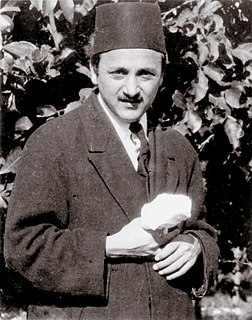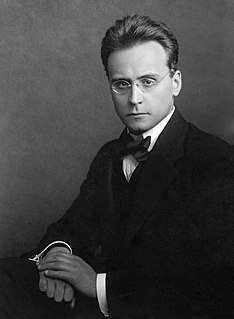A Quote by Rudolf Steiner
The history of our spiritual life is a continuing search for the unity between ourselves and the world. Religion, art, and science follow, one and all, this aim.
Related Quotes
When Coleridge tried to define beauty, he returned always to one deep thought; beauty, he said, is unity in variety! Science is nothing else than the search to discover unity in the wild variety of nature,-or, more exactly, in the variety of our experience. Poetry, painting, the arts are the same search, in Coleridge's phrase, for unity in variety.
The religion of art, like the religion of politics, was born from the ruins of Christianity. Art inherited from the old religion the power of consecrating things and endowing them with a sort of eternity; museums are our temples, and the objects displayed in them are beyond history. Politics--or more precisely, Revolution--co-opted the other function of religion: changing human beings and society. Art was an asceticism, a spiritual heroism; Revolution was the construction of a universal church.
Unity is surely the indispensable thing if meaning is to exist. Unity, to be very general, is the establishment of the utmost relatedness between all component parts... the aim is to make as clear as possible the relationships between the parts of the unity; in short, to show how one thing leads to another.
A really spiritual person will live life as an art, will create a deep harmony between the body and the consciousness. And this is the greatest art there is. His life will be a joy to see. And he will be fragrant, for the sheer reason that there is no split in his being. The very unity makes him organic; the wound of division is healed.
We are persons whose bodies can be objectively studied according to the impersonal laws of physics but whose minds are subjectively experienced in ways science has not yet been able to fathom. In short, by radically seperating science from religion, we are not merely segregating two human institutions; we are fragmenting ourselves as individuals and as a society in ways that lead to deep, unresolved conflicts in terms of our view of the world, our values, and our way of life.
This much I can say with definiteness - namely, that there is no scientific basis for the denial of religion - nor is there in my judgment any excuse for a conflict between science and religion, for their fields are entirely different. Men who know very little of science and men who know very little of religion do indeed get to quarreling, and the onlookers imagine that there is a conflict between science and religion, whereas the conflict is only between two different species of ignorance.
Modern physics has taught us that the nature of any system cannot be discovered by dividing it into its component parts and studying each part by itself... We must keep our attention fixed on the whole and on the interconnection between the parts. The same is true of our intellectual life. It is impossible to make a clear cut between science, religion, and art. The whole is never equal simply to the sum of its various parts.
It is not clear to anyone, least of all the practitioners, how science and technology in their headlong course do or should influence ethics and law, education and government, art and social philosophy, religion and the life of the affections. Yet science is an all-pervasive energy, for it is at once a mode of thought, a source of strong emotion, and a faith as fanatical as any in history.








































